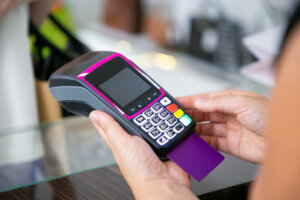Merchant service providers are the key to unlocking your company’s full payment potential. What is a merchant service provider, and how exactly does it work? This ultimate guide has answers to all your burning questions.
What is a Merchant Service Provider?
A merchant service provider (MSP) is a broad term for any type of software, hardware, or service enabling you as a business owner to process credit or debit card payments. Not only do MSPs facilitate the process, but they also help keep your company’s and customers’ finances safe.
As the internet gained popularity as a marketplace, merchant service providers rose to the challenge of offering comprehensive platforms. Today, the top MSP accounts provide point-of-sale tools and business analytics so your business has everything it needs to succeed.
The PCI Security Standards Council
The Payment Card Industry (PCI) Security Standards Council sets the bar for merchant service providers to follow. Constituted by American Express, Discover, JCB, MasterCard, and Visa, these companies help regulate the flow of money and protocols during business transactions.
Types of Merchant Service Providers
Not every merchant service provider is the same. For the most part, available services fall into one of three categories:
Merchant Account Providers
Generally speaking, merchant account providers set you up with a merchant account funds flow into after making a transaction. These providers then offer a means to process transactions from a debit or credit card and deposit it into this account.
A merchant account is not a business bank account, but rather a holding place for funds coming into your business. The merchant account provider transfers those dollars into your bank account periodically. Having a separate merchant account can be beneficial for tracking plastic transactions and controlling how funds move.
There can be fees associated with these extra accounts and the process used to process credit or debit card payments accordingly. If you’re looking into merchant service providers, be sure to check the types of cards they work with so you don’t find yourself in a sticky situation with an uncommon card.
Payment Service Providers
Payment service providers are another means of processing payments between buyers and merchants. Instead of having a merchant account, these providers lump merchants together to keep costs down. Being grouped with other businesses means you won’t have your own ID through which to channel funds.
These platforms don’t charge as much for this setup or typically require long-term contracts. On the flip side, you may not experience good customer service if things go awry. Payment service providers hold a lot of risk for letting you use their services, so it’s also more likely for them to freeze or terminate accounts with minimal warning. Even something as simple as a higher than usual payment can throw up a red flag.
Payment Gateway Providers
As the name implies, payment gateway providers create a path for online payments through a secure network. At present, these gateways are the only way business owners can collect payments through the internet.
Some providers will include a merchant account as part of the deal, while others offer a gateway only. In either case, you’ll have the interface you need for customers to shop from your site.
With cyberattacks at an all-time high, payment gateway providers add high levels of fraud prevention and security to keep you and your clients safe. Customers will want this peace of mind before purchasing your app or site.
Tracking the Transaction Process
When a customer makes a purchase, there’s more to the process than a simple swipe of a card. After the swipe, your MSP account sends a request to the customer’s credit card company regarding the purchase.
The credit card company forwards the information to the customer’s bank, where the bank checks for fraudulent activity and sufficient funds. Once the bank either accepts or rejects the transaction, it sends a message through the credit card company back to your MSP.
At this point, the transaction completes, and the customer has the product or service they desire. Depending on the speed of the credit card company, it may take minutes or a few days for the funds to appear in your merchant account.
Who Can Apply for a Merchant Service Provider?
Any business, no matter how large or small, can apply for a merchant service provider. Since MSPs assume risk by dabbling in financial matters, they can be particular about who they work with.
Your company may land in a hot spot if an MSP determines it to be high risk. Frequent returns or questionable charges can be all an MSP needs to reject an application.
What Tools Can Merchant Service Providers Provide?
A merchant service provider can toss a bunch of cool tools your way to help with payment processing. Check out some of the most common features below.
Merchant Accounts
Merchant accounts represent the bucket funds drop into whenever a customer makes a purchase in person or online using a plastic card. An MSP will then transfer the money into the bank account of your choosing.
The process may seem overcomplicated, but merchant accounts introduce a layer of protection designed to keep funds safe. Having a merchant account comes with a unique ID number to expedite transfers. Payment service providers are technically merchant accounts but don’t give a unique ID number.
Credit Card Terminals
Any physical store location needs credit card terminals to read credit and debit card information. Modern terminals connect to the internet through Ethernet or wireless connections, although those using WiFi tend to be more expensive.
It’s possible to either lease terminals or purchase them, depending on how long you envision using them down the road. Leasing these models usually isn’t a cost-effective option, so it’s almost always better to buy when you can.
It’s worth checking out terminals offering EMV compliance for chip cards and that extra layer of security. Similarly, you may wish to invest in NFC-based payment methods like Apple Pay and Google Pay, since these touch-and-go options are becoming increasingly popular.
Point of Sale Systems
Point of sale (POS) systems combine the benefits of credit card readers with a software-based solution for financial management and inventory tracking purposes. Many POS systems can run on tablets nowadays, eliminating the need for bulky computers.
You may even find point-of-sale systems with cash drawers, printers, or check scanners built right in. With the right platform, it’s possible to control all financial aspects from a single device.
Virtual Terminals
Virtual terminals turn a computer or mobile device into a credit card terminal. In most cases, businesses use these virtual interfaces to enter credit card information manually over the phone or tackle remote billing.
Some services include a card reader attachable to a USB port to handle in-person purchases quickly and easily. Where possible, it’s best to scan and keep a physical card on file to cut down on risk.
Mobile Payment Systems
Mobile payment systems enable you or your team to accept credit card payments with a smartphone or tablet. These systems come with a physical card reader that connects to your mobile device and collects card information.
As with credit card terminals, it’s best to choose a mobile payment system offering EMV compliance for extra security and NFC transactions for customers wishing to take a contactless approach. Devices with Bluetooth can introduce wireless connectivity, as headphone jacks on phones are going the way of the dinosaur.
Payment Gateways
Any business taking an online approach needs a payment gateway to receive payments in cyberspace. Gateways connect an online payment center to your merchant account or financial institution with minimal risk.
Only companies with an online presence need a payment gateway, so the service doesn’t typically come standard in merchant service provider packages. Don’t be surprised if you incur a monthly fee for using one. These services do introduce layers of security and customer management tools.
Online Shopping Carts
Online shopping carts are more than just an icon on a website. This software allows businesses to build and customize a website to highlight brands and products. Doing so creates a unique customer experience to stand out from the competition.
What Should You Look for in a Merchant Service Provider?
When picking out a merchant service provider for your business, not just any platform will do. Consider the following before making a purchase.
Features
A merchant service provider’s feature set should be a driving force in your decision-making process. If you’re doing business online, be sure to choose an MSP account with a payment gateway. Some providers add tools like inventory management or sales reporting to keep your business running smoothly.
Security
You and your customer base need to keep financial records safe and secure while performing transactions on the internet. MSPs often bulk up with fraud protection and encryption tools to block hackers from accessing your hard-earned money.
Hardware
For physical store locations, think about the type of hardware you want to use. Are mobile payment systems enough, or do you need full-blown point-of-sale systems? Picture the layout of your location and what makes the most sense before making any purchase.
Ease of Use
Hardware and software alike, it’s important to make sure your merchant service provider is quick and easy to use. If your team fumbles with credit card terminals or struggles through an app, it can reduce the likelihood of a repeat purchase. Such bumps also reduce efficiency, leading to less overall sales.
Support
A good customer service team at your back can get your system back online faster than you can say IT. On the other hand, limited access to support can leave you with hours or days of downtime before you can get up and running again.
Fees and Pricing
There can be a lot of fees associated with merchant service providers for the many services they offer. You should expect a monthly fee for using the service, but make sure the amount fits into your company’s budget.
Less obvious are fees for payment gateways or management software that can send costs through the roof. There may also be transaction fees each time you swipe a card. Should you need hardware solutions as well, weigh pricing options on larger units versus those with fewer features.
Frequently Asked Questions (FAQs) for Merchant Service Providers
Merchant service providers can take on many forms, and understanding them all can be a challenge. This FAQ answers some of the most common questions about these platforms.
Bottom Line on Merchant Service Providers
Merchant service providers are an integral part of any business hoping to accept credit or debit cards as a payment source. These services connect your system to the necessary entities for transactions to take place. With the uptick in online shopping, merchant service providers are more important than ever to maximize your selling potential.
 Sections of this topic
Sections of this topic















